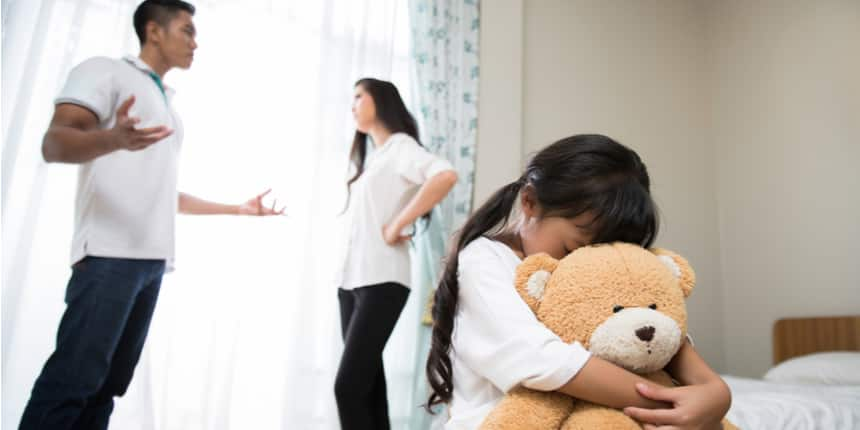How Does Parental Discord Impact A Teenager?
We all enter parenting with great hopes and aspirations. There are fears and worries too. We also take into it the ideals and expectations we have for ourselves and the child. In so many ways, parenting is to navigate the journey between the parent we hope/want to be and the parent that we are.

Perfectionism and the pressure of always doing things right, all the time, is also what parents get caught up with, such that the joy of parenting is often, unknowingly compromised. We question ourselves about how much time we give our children, how much we do for them, and how many things we get for them to fulfil all their needs.
Society as well sets up a benchmark for good parents and we constantly strive to achieve that. And when we are not perfect, there is shame. However, enough research in the field of psychology and attachment therapy emphasises that there is no one approach that works for all families and that there is no measuring yardstick against which we need to evaluate ourselves as parents. In other words, parents need to develop their own parenting approach. That in itself can be nerve-wrecking, and feel like a mammoth task.
In the times that we are in, it is absolutely essential to humanise parenting, to see parents as humans and hence, flawed, imperfect, and emotional beings. Enough damage has been done to families by putting parenting on a pedestal. It has put pressure on parents to act in ways that largely involve repeating parenting practices that were followed by the previous generations. The mindset and practices around discipline are one such example. Is perfectionism and enforcing discipline worth letting go of the joy that parenting brings with it?
In addition, when you are parenting with a partner/spouse, the journey needs to be attuned to that of the other parent. That is a huge task! There are bound to be disagreements, and differences in opinion between the couple. In fact, in my experience as a psychologist, there are very few couples with completely the same opinions about parenting and otherwise.
Couples can have disagreements for various possible reasons, like financial crisis, job loss, physical or mental illnesses, substance abuse and alcoholism, and the like. Societal expectations put pressure on the couple, affecting their relationship with each other, leading to conflict, fights and in some cases, constant bickering.
Whatever the reasons might be, parental discord can have both immediate, and long-term psychological impacts on the child and the family. This article specifically focuses on the impact of parental discord on adolescents.
Discord-Distress
Any form of relational conflict is a power struggle. Recurrent fights between parents that broadly demonstrate this power struggle will have an impact on the adolescent. For the benefit of understanding, some of the possible impacts of parental discord are stated in the points below. This is by no means an exhaustive list.
Anticipating Fights
During a fight, the nervous system of an individual gets activated leading to a dysregulated being. The emotional part of the brain is firing at that time, and decision-making and communication become difficult. A consistently activated brain is likely to anticipate fights between parents and be on the edge as a result of that.
Intense Emotional Reactions
Adolescents go through many developmental challenges that anyway create anxiety. Add to that parental conflict, and we have an emotionally-reactive person. We notice sad moods, a sense of helplessness, hopelessness and behaviours like acting out, withdrawing, yelling, getting into fights, disinterest in academics, sports, and bullying others, or being bullied. It is easy at this stage to misunderstand the adolescent and blame the parents. The adolescent may refuse to talk to the parent and hide feelings from them. They may also not share important life experiences with their parents.
 Parental Discord Can Cause Adolescents To Withdraw Emotionally
Parental Discord Can Cause Adolescents To Withdraw Emotionally
Self-Blame And Violence
Self-blame and feeling responsible for parental discord are commonly seen. This may lead to the child facing self-esteem issues in the future. Being a witness to recurrent parental conflict can lead to an adolescent resorting to violence, aggression, yelling, and in extreme cases hitting, to resolve problems.
Distrust Towards Parent/s
As stated earlier, conflicts are power struggles. The adolescent may or may not be directly involved in the conflict, but it will make trusting one or both parents difficult for them. There could be distrust and disrespect towards one parent and a feeling of needing to save the other. Imagine how difficult it must be a position to be in. Further, when there is emotional dumping on the teenager, it deeply impacts the connection and bond they share with their parents.
Unhealthy Adult Relationships
Parental relationship sets precedence, or more specifically, a blueprint for future relationships for the teenager. Normalising conflicts in relationships can be detrimental for the child in being able to create healthy adult relationships in the future.
What does this mean then? Does that mean it is not okay to fight? Does it also mean that the emotional dumping that the couple engages in during fights damages the teenager who is witness to such distress? Or that when we fight, the distress we cause to our children is irreparable?
Rupture And Repair
Every relationship has a texture. There is closeness, care, and respect. And there are fights. As parents, we inevitably lose our cool. The impact any conflict or discord has on a person or relationship to a large extent depends on the quality of the relationship shared by the individuals involved. What I mean by this is the nature of bonding and connection established by the parents between themselves and their adolescent child. What is this bond I am writing about?
The connection and bond is established by how responsive parents are, how consistently they show up for their adolescent, and how they provide safety and take responsibility for the discord and distress they create.
Let’s imagine two possible scenarios:
Everyone goes to separate rooms or spaces after fights–The parents shout at the kids for unnecessary reasons–Hurtful words and bickering continue for days–Everyone behaves like nothing hurtful happened.
Everyone sits together once they are calm, to talk about the hurt– The parents sit with each other and take responsibility for the distress–The parents help soothe the teen by cooking together or going for a walk.
In the above scenarios, the times when parents address the hurt and rupture, the connection and bond is strengthened. That is what is repair and there is power in that. It helps heal the wounds and gives everyone a fresh start.
Esther Perel, a psychotherapist, family systems therapist, and a best-selling author says, “Relationships follow a pattern of harmony, disharmony, and repair”.
Making Time For Conversation
I am a strong believer in making time and space for conversation in the family. Conversations that make space for active and empathetic listening from parents, where the adolescent is given a chance to share their feelings and concerns, and the parent is emotionally available. These conversations don’t (in fact, should not) happen only after fights or conflict, but must become a part of the daily family exchange. Creating moments of emotional connection cannot be limited to special occasions, or worse, only fights!
At the same time, after a fight or a disagreement, it is imperative to connect through regulated conversation. If you are wondering what a regulated conversation looks like after a fight, it is a vital question to bring up at this point. It looks something like this- imagine there has been a blowout seconds before, between you and your spouse, regarding a pending financial matter. Both of you were mean in your words and there was some shouting, your teen who was playing video games in the same room witnessed this and became visibly upset and worried (there could be other reactions like crying or running away). You say to your spouse “This shouting and meanness doesn’t make me feel nice after it's over, let's talk about this when we are calm”, after which you turn to your teen and say something like, “I bet this felt strange or terrible to you. Your parents have some important matters to talk about and they should not have shouted at each other. Sorry you had to witness that.” (a hug can be offered, and a ‘no’ should be accepted if given in response).
A parent apologising about being angry and yelling is likely to dissipate worry and distress for the adolescent. Connection time is also the time for setting loving and gentle limits around hurtful behaviour, like what to do the next time someone yells or shouts?
Dr. Ream, a psychologist specialising in working with parents, has written about how repair is about making sense of the rupture and providing an explanation to the child. It reassures them that they are loved.
This article does not provide quick-fixes to parental discord. In fact, it does not attempt at providing any suggestions on resolving conflict of any kind. It simply outlines the impact of a conflict, particularly parental discord, on the well-being of adolescents. The stigma and shame around seeking professional help to resolve and understand parental conflict inhibits many parents from bringing about the change in their lives they are hoping for. The Internet has now made many resources available to parents, to enable them to get started on their journey of change. If couples therapy seems daunting or your spouse doesn’t agree to therapy, there are other helpful resources like books, webinars, and workshops by leading experts in parenting, family therapists, and parent coaches (yes, like life coaches!) to get started on your journey of self-work.
Sidenote- This article also does not address the harm that abuse in families brings upon children and youth.
The writer is aware that women and men who are stuck in the cycle of marital discord that involves violence and abuse require legal and mental health support that this article does not include.
- Gunjan is a Clinical Psychologist and has worked with various schools as Counsellor, with children across the age spectrum. After more than a decade in the field, she took a sabbatical to focus on her wellbeing, spending some time travelling, immersing in yoga, and taking care of her twins. Gunjan works to upgrade the conversation around parenting, equal responsibility, career breaks, psychological upheavals, and limitations built into motherhood. Her personal inquiry makes space for a fresh, honest and nuanced conversation about the reality of urban parenting.
Applications for Admissions are open.
As per latest syllabus. Physics formulas, equations, & laws of class 11 & 12th chapters
JEE Main Important Chemistry formulas
Get nowAs per latest syllabus. Chemistry formulas, equations, & laws of class 11 & 12th chapters
JEE Main high scoring chapters and topics
Get nowAs per latest 2024 syllabus. Study 40% syllabus and score upto 100% marks in JEE
JEE Main Important Mathematics Formulas
Get nowAs per latest syllabus. Maths formulas, equations, & theorems of class 11 & 12th chapters
